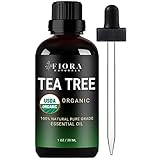Most gardeners use mulch to promote moisture retention and prevent weed growth. And that’s good. However, occasionally, you may see mushrooms growing in your mulch because it is organic matter. In addition to not looking aesthetically pleasing in the garden, some mushrooms can be dangerous to children and pets, making it imperative to eliminate them. Throughout this article, I explain how to get rid of mushrooms in mulch with a few simple and inexpensive methods. In addition, I give some gardener tips to prevent mushrooms from growing in mulch.
The vast majority of the methods I mention in this article to get rid of mushrooms in mulch are very inexpensive and include items you already have in your home.
Moreover, some of these methods eliminate these undesirable garden mushrooms naturally. Continue reading to learn how to get rid of mushrooms in mulch.
Table of Contents
Why Are Mushrooms Growing in Mulch?
Mulch is rich in decomposing matter and moisture, which makes it ideal for mushroom growth. Usually, mulch is made from organic materials such as wood chips, bark, straw, or peat moss. Mushroom spores are ubiquitous in the environment, and they can easily land on mulch. When conditions are favorable (moisture, temperature, and nutrient availability), these spores can germinate and develop into mature mushrooms. You can learn more about the mushroom life cycle in this article.
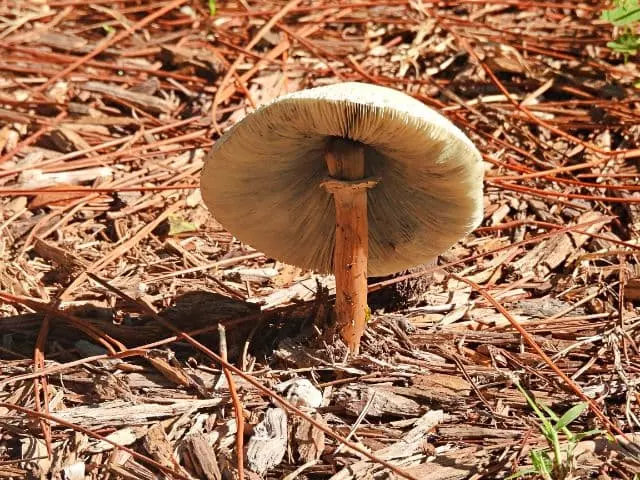
How to Get Rid of Mushrooms in Mulch
Fortunately, there are several methods for getting rid of mushrooms in mulch. Most of these methods are very inexpensive and consist of items you already have in your home, such as vinegar or soap. These are the methods to get rid of mushrooms in mulch that I will mention:
- Vinegar
- Baking Soda
- Soap and Water
- Fertilizers Rich in Nitrogen
- Tea Tree Oil
- Fungicides
These methods kill mushrooms in mulch. Also, I explain how to prevent mushrooms from growing in mulch. Prevention is the best in these cases.
The Scientific Reason Behind Using Vinegar or Baking Soda to Get Rid of Mushrooms In Mulch
It is widespread to hear advice to add vinegar or baking soda to the garden for different purposes and benefits. However, in this opportunity, these two methods are only to treat the mulch that constantly presents mushroom growth (and not the whole garden). Both methods, as opposed to each other, are based on the same rationale: to change the pH of the mulch to discourage the growth of mushrooms that prefer an acidic pH of around 4. The natural decomposition of the mulch components causes a pH environment of around 4, which favors the growth of mushrooms. The addition of vinegar or the addition of bicarbonate, then, seeks to change the mulch surface pH so that the growth environment of the mushrooms is no longer favorable and thus eliminates them and prevents their development. Vinegar further lowers the pH, and baking soda raises the pH. Both methods should not be used simultaneously.
In the following paragraphs, I explain each of these methods to eliminate mushrooms step by step.
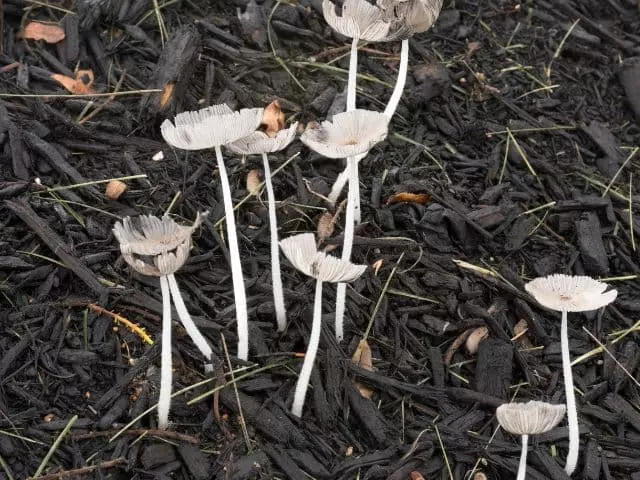
Vinegar
Vinegar is one of the easiest methods to get rid of mushrooms in mulch. I’m sure all gardeners have vinegar in their homes that is also used for many things around the house. It is best to use white vinegar. The acetic acid in the vinegar will kill both the mushroom and the spores.
Simply combine one part white vinegar with four parts water. Mix well and use a spray bottle to apply the mixture to the mushrooms and affected mulch. Avoid applying this mixture to the leaves of nearby plants.
Baking Soda
Baking soda is also used in every home and is ideal for getting rid of mushrooms in mulch. The vast majority of mushrooms grow in acidic soils, and what baking soda does is raise the pH of the mulch.
Combine two tablespoons of baking soda with one gallon of water, and then apply the mixture to both the mushrooms and the soil using a spray. Personally, I recommend removing the mushrooms and then applying the mixture to prevent new mushrooms from growing in mulch.
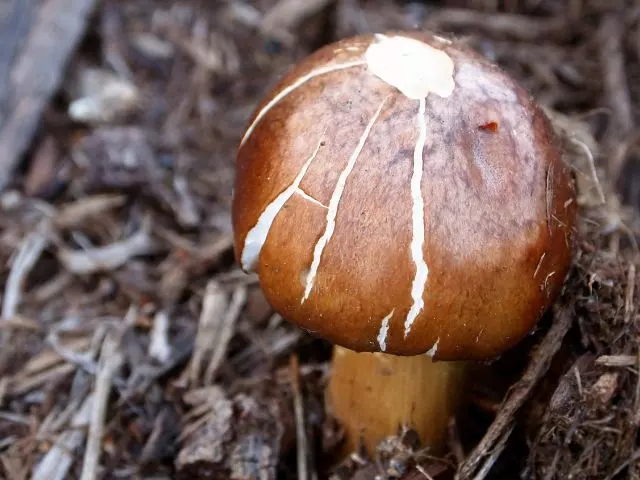
Soap and Water
Dish soap and water is another excellent, inexpensive way to get rid of mushrooms in mulch. Basically, mix three tablespoons of dish soap every two gallons of water. Then, use a spray bottle to apply it to the mulch with mushrooms. If possible, first remove the mushrooms manually so that the mixture prevents the growth of new mushrooms in the mulch.
Fertilizers Rich in Nitrogen
Using fertilizers rich in nitrogen can help reduce the growth of mushrooms in mulch because high nitrogen levels can inhibit the development of mushrooms. Nitrogen-rich fertilizers promote the growth of plants and lawns, which can compete with mushrooms for nutrients and create a less favorable environment for them.
Pull up the mushrooms by hand and apply the nitrogen-rich fertilizer according to the manufacturer’s directions. In a few days, you should see no more mushrooms growing in the mulch.
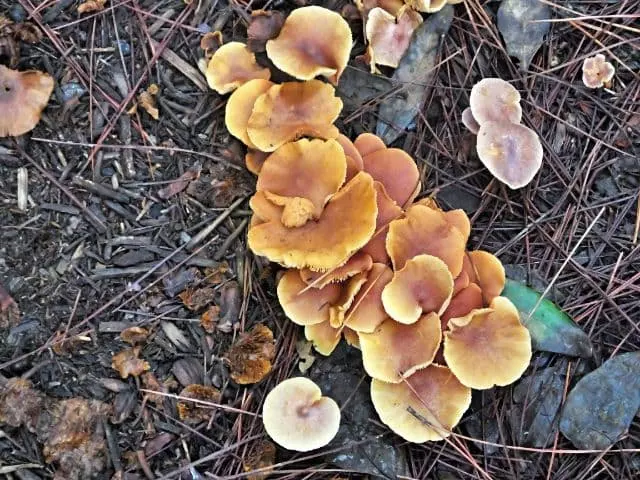
Tea Tree Oil
Tea tree oil is a very effective method to get rid of mushrooms in mulch. It is also used to kill fungi inside the home and on plants. A study by the University of Adelaide showed that tea tree oil is even more effective than vinegar and other commercial products in killing fungus.
To prepare the tea tree oil mixture, you will also need some baking soda and water. Combine four tablespoons of baking soda, two tablespoons of tea tree oil, and one gallon of water. Stir the mixture well to ensure that the baking soda and tea tree oil are thoroughly dissolved in the water.
Use a spray bottle to apply the mixture. Spray the solution directly onto the mushrooms and the surrounding soil in the affected area. You may need to reapply the solution after rainfall or if new mushrooms appear.
- USDA Certified Organic Tea Tree Oil - 100% Natural, Steam distilled, 100 Percent pure, undiluted oil with no additives or fillers. Highly potent unfiltered. Packaged in the USA
- Therapeutic Grade Tea Tree Oil - Our high potency Essential oil. Ideal for Dandruff, Razor bumps and Ingrown hair
- Aromatherapy - Add a few drops of TeaTree Oil in a diffuser to freshen up the air, or use as massage oil for the body.
Fungicides
Commercial fungicides available in stores are designed to kill mold and mildew. These fungicides will not kill the mushrooms in the mulch, but they will prevent them from growing. Suppose you have some fungicide because you used it on a plant. In that case, you can manually remove the mushrooms from the mulch and then apply the fungicide to prevent them from growing back.
I, personally, prefer to use one of the other methods mentioned to get rid of mushrooms in mulch. Still, I wanted to mention the fungicide method because many gardeners may have some fungicide in their homes and could take advantage of it.
How to Prevent Mushrooms from Growing in Mulch
Preventing mushrooms from growing in mulch involves creating an environment that is less favorable for their development.
Avoid overwatering your mulch. Mushrooms thrive in damp conditions, so proper watering techniques are crucial. You can use a drip irrigation system to water your plants and avoid wasting water properly.
Remove any fallen leaves, branches, withered flowers, dropped fruit, or animal excrement from your mulch. These items may carry fungal spores that can result in a mushroom outbreak. Allowing them to remain on your mulch can also increase the acidity of the soil, making it a more inviting habitat for fungi.
Rake your mulch regularly. Regularly turn and aerate the mulch. That helps break up the mycelium network that mushrooms use to grow and spread. If mushroom growth persists, consider removing the existing mulch and replacing it with a new layer.
By following these simple tips, you will be able to prevent mushrooms from growing in mulch. I always recommend pulling the mushrooms and then applying one of the above methods to prevent them from growing back.
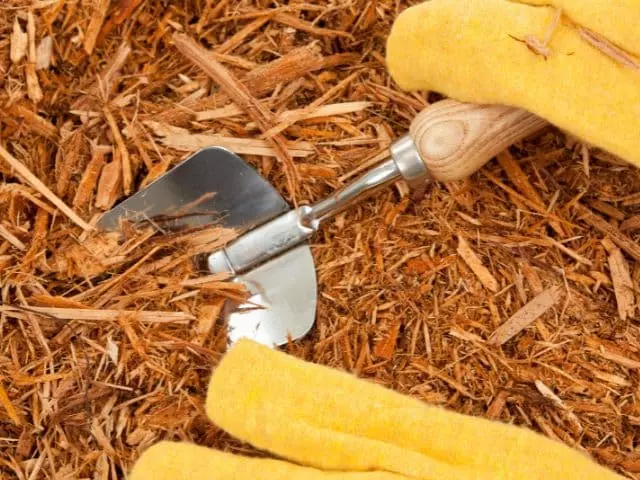
Final Conclusions
Mushrooms are usually beneficial to plants and soil but can be dangerous in gardens where pets and children are present. They are also often unsightly. That’s why I recommend constantly removing them, especially for children playing in the garden.
Most of the methods mentioned to get rid of mushrooms in mulch are very economical and have elements that you always have in your home, such as dish soap, baking soda, or white vinegar. All of the above methods are very effective.
Prevention is always best to prevent mushrooms from growing in mulch. Also, it is best to remove the mushrooms and then apply one of the methods mentioned above to prevent them from growing back into the mulch.
Frequently Asked Questions About Mushrooms Growing in Mulch
Does Vinegar Kill Mushrooms in Mulch?
Vinegar contains acetic acid, which can kill mushrooms in mulch. Note that vinegar can change the pH of the soil if applied in large quantities. Apply with caution. Avoid applying vinegar to plants. Only apply it to mulch.
Should I Remove Mushrooms from My Mulch?
Suppose you have pets or young children who may be tempted to eat or play with the mushrooms. In that case, it is advisable to remove them, especially if you are unsure of their toxicity. Some wild mushrooms can be poisonous.
It is also advisable to remove the mushrooms from the mulch and apply some of the methods mentioned above to prevent them from growing again.
Are Mushrooms Growing in Mulch Harmful?
Some of the mushrooms that grow in mulch can be harmful. It is recommended never to eat them. Many species of mushrooms grow in your garden, such as Amanitas, puffballs, and slime mold. To learn more about the types of edible mushrooms, I recommend you to read our article, orange edible mushrooms.

